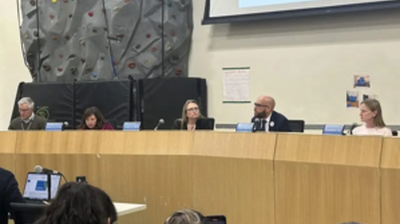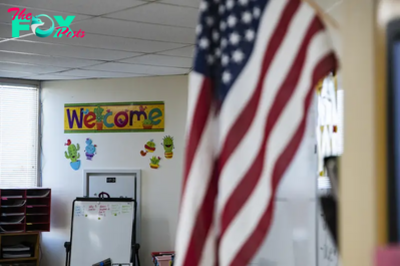Education
A Colorado bill aims to make charter schools more transparent. Opponents say it’s a “blatant attack.”
A bill from a group of liberal Colorado Democrats aimed at increasing transparency and accountability at charter schools has sparked major opposition, including from Gov. Jared Polis, bipartisan education groups and parents and students.
The lawmakers who introduced House Bill 1363 this month say they value charter schools and simply aim to hold them to the same level of scrutiny that public schools face.
“School choice is rooted in informed decision-making,” said Rep. Lorena Garcia, a bill sponsor and a Democrat from unincorporated Adams County. “If charter schools are not willing to be open and transparent and support informed decision-making within the parent population, then it begs the question of, what are they actually trying to hide?”
Opponents of the bill say it pushes sweeping changes designed to undercut the innovation and flexibility they say set charter schools apart.
“It is clearly just a blatant attack on charter schools and charter school families,” said Brenda Dickhoner, president and CEO of conservative Education organization Ready Colorado, which signed onto a letter opposing the bill with a bipartisan group of Education advocates earlier this week.
The letter said more than 40,000 emails have landed in legislators’ inboxes from charter school supporters across the state urging them to stop the legislation.

The fight is the latest example of political tension over charter schools in the state, largely pitting Republicans and conservative charter school supporters against Democrats and the state’s largest teachers union, which supports the legislation.
Charter schools are public schools managed by outside nonprofit operators that establish a performance contract often with a school district, which serves as the authorizer. The contract grants charter schools more flexibility than traditional public schools over how they educate children, but they are still subject to the same standards and assessments as traditional public schools. Colorado has more than 260 charter schools that educate more than 135,000 students, which represents roughly 15% of the state’s public school population in preschool through high school.
What rules would the legislation impose?
The bill proposes several changes that would tighten regulations and affect operations at charter schools, including repealing a law that prevents them from having to pay rent for school district facilities. Under the law, independent charter schools don’t have to pay more than $12 per year to lease a building owned by a public school district.
The bill would also amend a law that bans local school boards from placing a moratorium on the approval of charter schools. Under the legislation, a district facing declining enrollment or a projected drop in enrollment would have the power to prohibit charter schools from entering their district. And school boards would have the authority to revoke or not renew a district charter school contract due to declining enrollment in either the district or the charter school. Charter schools would still be able to appeal the decision.
The bill also proposes punitive measures for charter schools that fail to display information “in plain and easy-to-understand language” about laws and policies they’re exempt from on their website and their school districts’ enrollment website. Charter schools that don’t comply could lose their charter contract.
☀️ READ MORE
Colorado charter schools performing better than public schools, but serious gaps remain
A Colorado charter school network fired its management group. Now, it could face a lawsuit.
Charter school network STRIVE Prep to close northwest Denver high school in possible sign of what’s to come
And the bill would reroute some state funding from charter schools to the districts that authorize them, giving more funds to districts to help cover costs associated with providing administrative support and special education programming to charter schools.
Sen. Lisa Cutter, a Littleton Democrat who is also a lead sponsor of the bill, said the transparency is necessary given how some special interest groups pump money into some charter schools, pointing to the Walton Family Foundation as an example. The foundation has given more than $407 million to charter schools to help them expand since 1997, according to its website.
“I think that there’s a fear that there’s a movement to try to privatize public education,” Cutter said. “We need to understand what other kinds of interests are at play.”
Amie Baca-Oehlert, president of the Colorado Education Association, also cites a need for greater transparency in the specific waivers that allow charter schools to be more flexible and innovative. That’s a big reason why CEA, the state’s largest teachers union, hopes the legislation succeeds.
“There are many charter schools that exist to serve or fulfill a certain need or aspect in a community,” Baca-Oehlert said, “but we also believe very strongly that they should have the same standards of transparency and accountability that our traditional neighborhood schools do as well.”
“We’re slamming the door on opportunity”
Larry Thomas, an Aurora parent whose son is enrolled in a charter school, is an advocate for more oversight of charter schools to ensure they are meeting expectations and living up to the vision they’ve set for themselves.
Thomas, who said his son has thrived at Colorado Early Colleges Aurora, supports some parts of the bill, including one that would mandate that at least one-third of a charter school’s governing body is filled by parents or legal guardians of students at the charter school and people who represent the demographics of the local community.
“Then you have people who have skin in the game who are going to be making some decisions,” he said.
-

 Education37m ago
Education37m agoWhat would it mean if President-elect Trump dismantled the US Department of Education?
-

 Education3d ago
Education3d agoPhiladelphia students have a new reading and writing curriculum − a literacy expert explains what’s changing
-

 Education3d ago
Education3d agoWhy school police officers may not be the most effective way to prevent violence
-

 Education5d ago
Education5d agoCampus diversity is becoming difficult to measure as students keep their race and ethnicity hidden on college applications
-

 Education6d ago
Education6d agoFederal judge rules that Louisiana shalt not require public schools to post the Ten Commandments
-

 Education6d ago
Education6d agoCampuses are ground zero in debates about antisemitism − but that’s been true for 100 years
-

 Education1w ago
Education1w agoSocioeconomic status explains most of the racial and ethnic achievement gaps in elementary school
-

 Education1w ago
Education1w agoMothers, metaphors and dyslexia: What language reveals about the challenges of a child’s learning disability



























